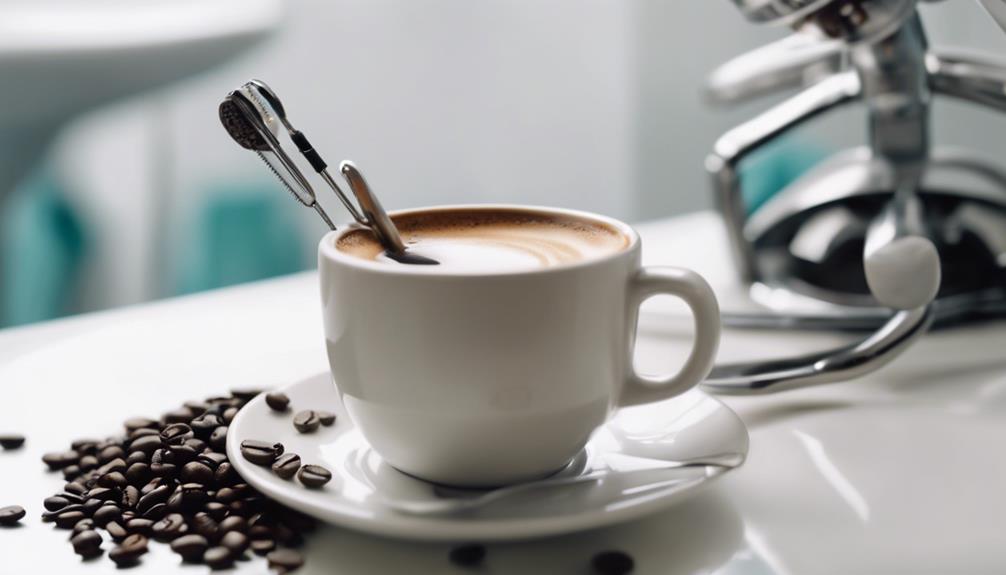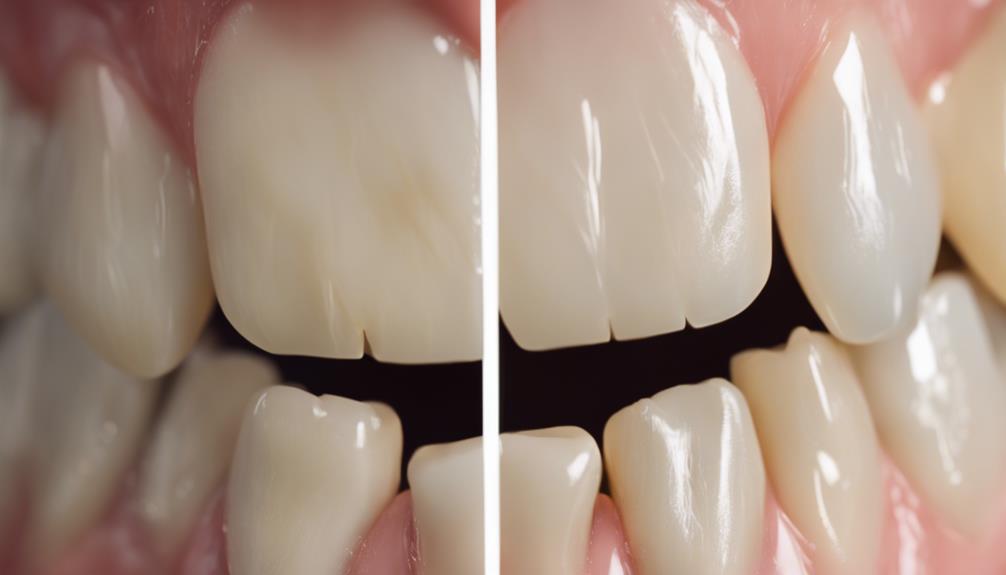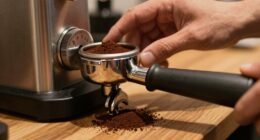After having a tooth extraction, it is essential to refrain from drinking coffee for a certain period in order to ensure a smooth and complication-free recovery. Caffeine can hinder the healing process, interfere with blood clot formation, and increase the risk of bleeding. Additionally, the acidity and high temperature of coffee can irritate nerve endings and prolong blood clotting time. To prioritize your dental health, it is recommended to avoid coffee for at least 5 days post-extraction. In the meantime, consider opting for gentle beverages like lukewarm water and herbal teas to help with your recovery. Find out more about promoting a healthy healing process and safe alternatives to coffee.
Key Takeaways
• Avoid drinking coffee for at least 5 days after tooth extraction to promote healing and prevent dry socket risk.
• Caffeine in coffee can disrupt blood clot formation, increase heart rate, and delay recovery, so it's best to opt for caffeine-free alternatives.
• Drinking hot or cold coffee can irritate nerve endings in the socket and hinder the healing process, so lukewarm beverages are recommended.
• Herbal teas like chamomile, peppermint, and ginger are soothing alternatives that reduce inflammation and promote healing.
• Gradually reintroduce coffee into your diet over 2 weeks, monitoring your body's response, to ensure a smooth recovery.
Risks of Caffeine in Coffee
When you drink coffee after a tooth extraction, the caffeine it contains can lead to a range of complications that hinder the healing process.
The caffeine in coffee can cause blood vessel dilation, increasing the risk of bleeding by raising blood pressure. This can dislodge or dissolve the vital blood clot needed for proper healing, which can negatively impact the extraction site and delay healing.
Additionally, the high temperature of coffee can irritate nerve endings in exposed tooth sockets, further hindering the healing process.
Furthermore, coffee's acidity can prolong blood clotting time, further delaying the healing process after a tooth extraction.
It's important to be aware of these risks when considering drinking coffee after a tooth extraction. By understanding the potential complications, you can make informed decisions about your oral health and prioritize a smooth recovery.
How Caffeine Affects Healing

Understanding how caffeine affects your healing process is crucial as you recover from a tooth extraction.
You might be unaware that caffeine can hinder your body's natural healing mechanisms, leading to slower recovery and potential complications.
Caffeine Slows Down Healing
Drinking coffee after a tooth extraction can hinder your recovery process. A key culprit behind this delay is caffeine's impact on healing. When you drink coffee after tooth extraction, the caffeine can disrupt the healing process, leading to a slower recovery. Caffeine raises your blood pressure, which slows down healing.
Additionally, the increased blood flow caused by caffeine can dislodge the blood clot that forms at the extraction site, which is vital for healing. The heat from the coffee can also irritate the nerve endings in the extraction site, further impacting healing.
Research has shown that caffeine consumption delays wound healing by affecting blood clotting time. This means that your dental healing process can be noticeably slowed down if you indulge in a caffeine fix too soon after the extraction.
To ensure proper healing, it's important to avoid drinking coffee after a tooth extraction and prioritize your dental health.
Increased Heart Rate Matters
Your heart rate plays a significant role in the healing process, and caffeine's ability to increase it can have a profound impact on your recovery after a tooth extraction.
If you're craving a caffeine fix first thing in the morning, it's important to take into account the potential consequences. An increased heart rate from caffeine can hinder the healing process, leading to complications like dry socket.
Here's what you need to know:
- Caffeine raises heart rate: This can affect blood pressure and blood clot formation, important for healing.
- Increased heart rate delays healing: Caffeine can impede the healing process, leading to complications.
- Stable heart rate is key: Maintaining a stable heart rate is vital for effective healing after a tooth extraction.
- Avoiding coffee promotes recovery: Skipping coffee can support a faster and smoother recovery.
Blood Clot Disruption Risk
Caffeine's interference with blood clot formation can greatly impede the healing process after a tooth extraction, putting you at risk of developing dry socket and other complications.
When you consume coffee after a tooth extraction, the caffeine can disrupt the formation of a blood clot, which is important for protecting the extraction site from bacteria and promoting healing. This can lead to a dry socket, a painful condition that can prolong your recovery time.
Additionally, coffee's effects on blood vessels and blood pressure can also hinder the healing process. Prioritizing your mouth's healing by avoiding coffee and other caffeinated beverages for a while is crucial.
Instead, stick to water and other hydrating liquids to help your mouth heal. Eating a small meal before taking pain medication can also be beneficial.
Coffee Temperature and Clotting
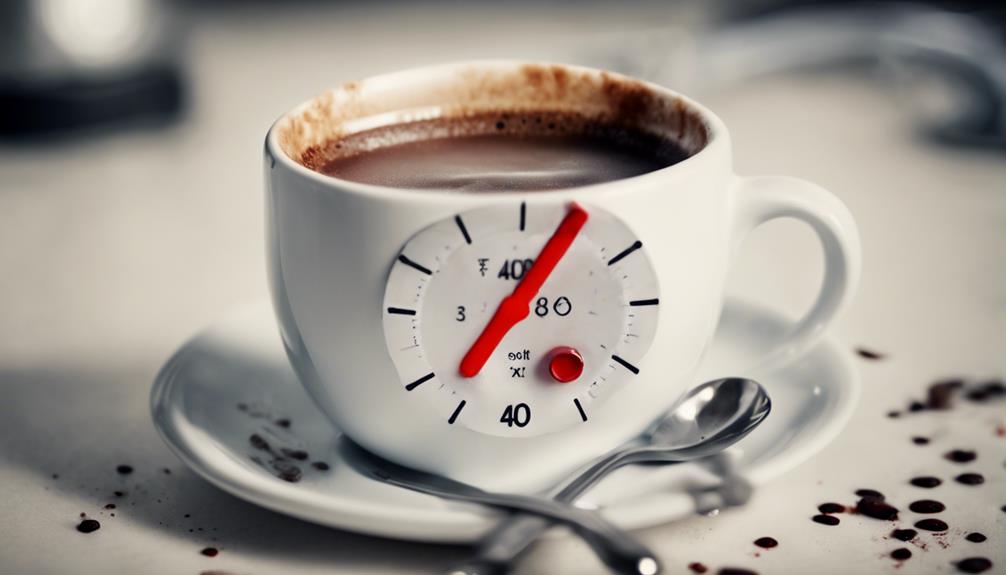
As you recover from a tooth extraction, the temperature of your coffee can greatly impact the formation of a blood clot, an important aspect of the healing process. Hot coffee, in particular, can be detrimental to your recovery. The high temperature can irritate nerve endings in exposed tooth sockets, hindering the healing process. Additionally, the acidity in coffee can delay blood clotting time and negatively impact wound healing post-extraction.
To promote proper healing, it's vital to be mindful of your coffee temperature. Here are some key takeaways to keep in mind:
- Avoid hot coffee: High temperatures can disrupt the formation of a blood clot, which is vital for healing.
- Cold coffee isn't a safe bet either: While less damaging, cold coffee can still hinder the healing process immediately after tooth extraction.
- Wait at least 72 hours: Before consuming lukewarm or cold coffee, wait at least 72 hours after a simple tooth extraction to promote proper healing.
- Opt for lukewarm or cold coffee eventually: When you do start drinking coffee again, opt for lukewarm or cold coffee to minimize any potential disruptions to the healing process.
Safe Alternatives to Coffee

As you recover from tooth extraction, you'll want to prioritize gentle beverages that promote healing and avoid disrupting the clot.
You can opt for herbal tea options like peppermint, chamomile, or hibiscus, which are calming and easy on the mouth.
Alternatively, you can try other gentle beverages that are easy to consume and won't irritate the extraction site.
Herbal Tea Options
You can turn to herbal teas like chamomile, peppermint, and ginger, which offer a soothing and non-acidic alternative to coffee after tooth extraction. These herbal teas are safe alternatives that can help reduce inflammation and promote healing. They provide comfort and hydration without risking complications like dry socket. Opting for herbal teas can still offer a warm beverage experience without the negative effects of coffee.
Here are some benefits of choosing herbal teas:
- Soothe discomfort: Herbal teas can help reduce pain and discomfort after tooth extraction.
- Promote healing: Non-acidic and gentle, herbal teas create an ideal environment for your mouth to heal.
- Stay hydrated: Herbal teas can help replenish fluids and electrolytes, keeping you hydrated and comfortable.
- Caffeine-free relaxation: Enjoy a calming and gentle beverage experience without the stimulating effects of caffeine.
Gentle Beverages Only
In the first few days after tooth extraction, stick to gentle beverages only, like lukewarm water or herbal tea, to avoid disrupting the healing process.
You'll want to opt for non-caffeinated options that promote a smooth recovery. Cold beverages like iced water or fruit-infused water can provide hydration without the risks associated with coffee post-extraction.
Room temperature beverages like lukewarm broth or clear soups can be soothing and beneficial for your recovery. Herbal teas such as chamomile or peppermint can offer a comforting alternative to coffee and help promote relaxation during the healing period.
Avoid acidic or carbonated drinks that can irritate the extraction site, and instead choose gentle, non-caffeinated options. By doing so, you'll be supporting your body's natural healing process and ensuring a swift recovery from tooth extraction.
When to Reintroduce Coffee

After a tooth extraction, an important milestone in the recovery process is reached when you can once again enjoy your daily cup of coffee, but it's important to time it right. You'll want to wait at least 5 days before reintroducing coffee back into your daily routine. This allows your body to heal and minimizes the risk of complications.
Here are some guidelines to follow when reintroducing coffee:
- Wait at least 5 days: Allow your body to heal and reduce the risk of complications.
- Ensure swelling is minimal: Make sure any swelling has decreased considerably before resuming coffee consumption.
- Gradually increase coffee intake: Don't go back to your normal coffee habits immediately. Gradually increase your coffee intake over a period of 2 weeks to avoid complications.
- Monitor your recovery: Keep an eye on your body's response to coffee and adjust your intake accordingly. If you experience increased soreness, Contact your dentist for guidance.
Promoting Healthy Healing Process

By taking the right steps, you can promote a healthy healing process following a tooth extraction, which is important for a smooth and speedy recovery. A blood clot formation is essential for the healing process, and avoiding coffee post-extraction helps prevent the risk of developing dry socket.
Following a proper diet and care regimen is necessary for ideal healing. Consuming coffee can slow down the healing process by raising blood pressure, making it essential to limit or avoid it during the post-extraction period.
Maintaining oral hygiene and avoiding substances that hinder healing are also critical for a smooth recovery. By focusing on a healthy diet and proper care, you can promote a healthy healing process and reduce the risk of complications.
Managing Pain and Discomfort
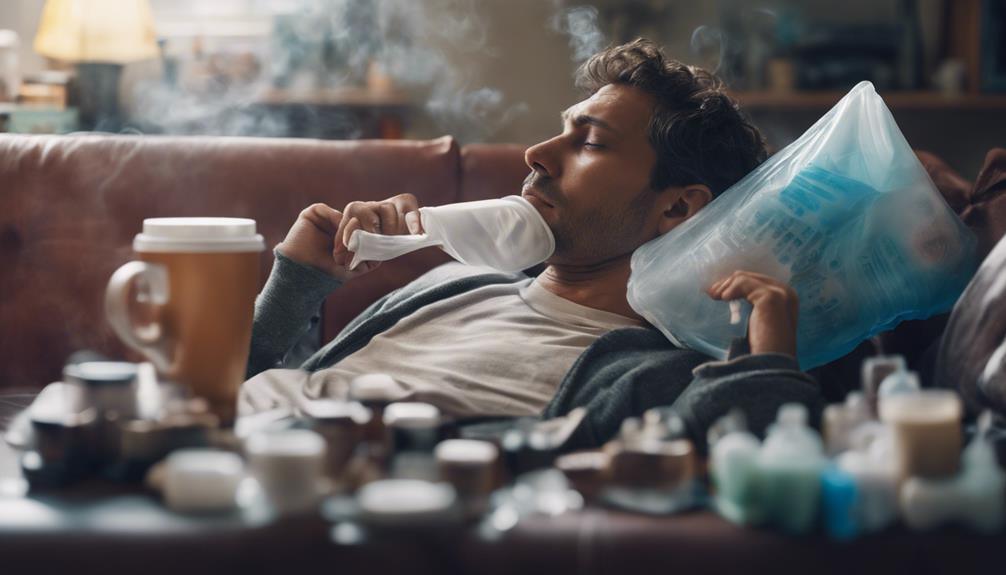
You'll likely experience some pain and discomfort after a tooth extraction, but fortunately, there are ways to effectively manage these symptoms. Your dentist will likely prescribe pain medication to help alleviate any discomfort.
Additionally, applying a cold compress to the outside of your cheek can help reduce swelling and alleviate pain.
To ensure a smooth recovery, be sure to follow these tips:
- Take your prescribed pain medication as directed by your dentist to manage pain and discomfort.
- Apply a cold compress to the outside of your cheek to reduce swelling and alleviate pain.
- Avoid using a straw when drinking liquids to prevent dislodging the blood clot and causing additional pain.
- Eat soft, cool foods like yogurt or smoothies to provide relief and nourishment while minimizing discomfort.
Post-Extraction Diet and Beverages

During the initial recovery period, it's essential that you prioritize a gentle, soothing diet to promote healing and minimize discomfort. A well-planned post-extraction diet is important for a smooth recovery process.
According to the University of Utah, soft and bland foods are recommended for the first few days post-extraction to aid in healing. Hydration is also important, and you should drink plenty of water to help your body recover.
Avoid using straws, as the suction can dislodge the blood clot and hinder the healing process. Additionally, steer clear of carbonated drinks, which can also disrupt the blood clot.
When it comes to beverages, it's best to avoid hot drinks like coffee immediately after tooth extraction. However, you can gradually reintroduce coffee into your diet after 5 days, following your dentist's recommendations for best healing.
Frequently Asked Questions
When Can I Start Drinking Coffee After Tooth Extraction?
Following a tooth extraction, you're likely wondering when you can safely drink coffee again. It's crucial to wait at least 5 days before resuming coffee consumption to allow your mouth to heal properly. Drinking coffee too soon can hinder the healing process, leading to increased soreness.
Adhere to your dentist's guidelines for post-extraction care, and consult them if you experience any discomfort. Once you've received the green light, you can enjoy your coffee again, usually around 2 weeks after the extraction.
Is Caffeine Bad for Healing Tooth Extraction?
You might wonder if caffeine is bad for healing after a tooth extraction.
The answer is yes, it is. Caffeine can hinder the healing process by increasing blood pressure, dislodging the blood clot, and dilating blood vessels, which delays recovery.
It's important to avoid caffeine-containing beverages like coffee to promote proper healing and minimize complications.
What Drinks to Avoid After Tooth Extraction?
You should steer clear of certain drinks after tooth extraction to guarantee a smooth recovery. Avoid acidic beverages like citrus juices, as they can hinder the healing process.
Carbonated drinks, like soda, can disrupt blood clot formation, and hot beverages, including coffee, can dislodge the clot.
Additionally, drinking through a straw can also dislodge the clot, leading to dry socket. Opt for lukewarm or cold drinks instead to promote healing.
When Can I Drink Hot Coffee After a Dental Implant?
You're wondering when you can drink hot coffee after a dental implant. The general guideline is to wait at least 5 days to allow for proper healing.
Drinking hot coffee too soon can dislodge the blood clot, leading to dry socket and delayed healing.
Follow your dentist's guidance on when it's safe to resume hot coffee consumption to guarantee a successful recovery.
Conclusion
After a tooth extraction, it's important to prioritize your healing process.
Did you know that approximately 70% of patients don't follow post-extraction instructions, leading to complications?
By understanding the risks of caffeine, coffee temperature, and safe alternatives, you can guarantee a smooth recovery.
Remember, a healthy healing process is vital, and making informed decisions can greatly reduce the risk of complications.
